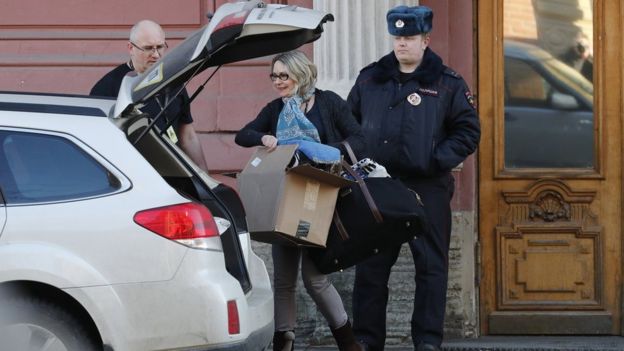Russia has told Britain a total of more than 50 of its diplomats will have to leave, amid a deepening row over the poisoning of a former Russian spy and his daughter in the UK.
Moscow initially expelled 23 British diplomats after 23 Russian diplomats were ordered out by London.
But now the Russians are insisting that even more UK diplomats should leave.
It says the UK and Russian diplomatic missions should be the same size in each country.
In practice that would mean at least another 27 UK officials being sent home, the BBC’s Paul Adams reports from Moscow.
But it is also possible that some of the additional reduction could be made up by laying off local staff.
The British government blames Russia for the nerve agent attack on Sergei and Yulia Skripal in Salisbury in southern England on 4 March. Moscow denies it.
Mr Skripal remains in a critical but stable condition. Yulia’s condition is said to be improving.
On Friday the British ambassador in Moscow, Laurie Bristow, was told that the UK had a month to cut its diplomatic mission in Russia to the same size as the Russian mission in Britain.
On Saturday, Russian foreign ministry spokeswoman Maria Zakharova told Reuters news agency that meant Britain would have to cut “a little over 50” of its diplomats in Russia.
“We asked for parity,” she said.
How has the UK reacted?
A UK Foreign Office spokeswoman said: “The Russian response is regrettable but in light of Russia’s previous behaviour, we anticipated a response.
“However, this doesn’t change the facts of the matter: the attempted assassination of two people on British soil, for which there is no alternative conclusion other than that the Russian state was culpable.”
Some 150 Russian diplomats have been expelled by mainly Western countries as their governments have rallied behind Britain.
Russia initially hit back at the UK, but then announced 60 US expulsions in reaction to Washington’s expulsion of a similar number of Russian diplomats. On Friday, Russia called in a string of foreign ambassadors with news that their own countries’ measures were being matched.
UN Secretary General Antonio Guterres on Thursday issued a warning over “a situation that is similar, to a large extent, to what we lived during the Cold War”.
Aeroflot plane incident
Russia’s ministry of transport has meanwhile demanded an official explanation over the searching of an Aeroflot passenger plane by UK officials at London’s Heathrow airport on Friday.
“If there is no explanation, the Russian side will deem the actions towards our plane as illegal and also reserve the right to take similar action against British airlines,” it said in a statement.
UK Security Minister Ben Wallace said in a statement that it was “routine for Border Force to search aircraft to protect the UK from organised crime and from those who attempt to bring harmful substances like drugs or firearms into the country”.
He added: “Once these checks were carried out the plane was allowed to carry on with its onward journey.”
A man identified as the pilot, Vitaly Mitrofanov, has told Russian TV he refused to leave the aircraft and was confined to the cockpit while British officials accompanied by a sniffer dog searched it.
Russia singles out UK again
By Paul Adams, BBC News, Moscow
British diplomats left Moscow a week ago, but ambassador Laurie Bristow was summoned back to the foreign ministry for additional punishment.
Beyond the issue of parity, the Russian side hasn’t really explained why it’s made the latest demand.
But it’s clear that Russia sees Britain as the ringleader of an international conspiracy which resulted in the biggest mass expulsion of Russian diplomats in history.
Britain’s “provocative and unjustified actions”, the ministry said, had “inspired the unfounded expulsion of Russian diplomats”.
It’s a backhanded compliment to Prime Minister Theresa May, who has successfully corralled a wider international coalition than anyone would have thought possible a month ago.
Russia has railed against the British government over its efforts to internationalise what officials here call “the so-called Skripal affair”. The solidarity expressed by so many countries has been dismissed as a result of financial and political pressure, orchestrated in tandem with the US.
Which other countries are involved?
Twenty-nine countries expelled 145 Russian officials in solidarity with the UK – and Nato also ordered 10 Russians out of its mission in Belgium.
The US expelled the largest single number – 60 diplomats – and closed the Russian consulate general in Seattle.
Russia reciprocated on Thursday declaring 58 US diplomats in Moscow and two in the city of Yekaterinburg to be “personae non gratae”. It also announced the closure of the US consulate in St Petersburg.
The US said it had been expecting the move and warned it may take further action.
On Friday, ambassadors from Albania, Australia, Canada, Croatia, the Czech Republic, Denmark, Estonia, Finland, France, Germany, Ireland, Italy, Latvia, Lithuania, Macedonia, Moldova, the Netherlands, Norway, Poland, Romania, Spain, Sweden and Ukraine were told to send home staff from their missions – corresponding to the same number of Russians their countries had expelled.
A statement by the Russian foreign ministry also said that Russia “reserves the right to take retaliatory measures” against Belgium, Hungary, Georgia and Montenegro – countries that had joined the co-ordinated action against Russia “at the last moment”.
What is Russia’s argument?
Russian Foreign Minister Sergei Lavrov has blamed “harsh pressure from the United States and Britain under the pretext of the so-called Skripal case”.
He reiterated Russian calls for consular access to Yulia Skripal – a Russian citizen. The UK Foreign Office says it is considering this “in line with our obligations under international and domestic law, including the rights and wishes of Yulia Skripal”.
Russia, Mr Lavrov said, was also seeking a meeting with leaders of the Organisation for the Prohibition of Chemical Weapons (OPCW) to “establish the truth”.
BBC
 Q FM Africa's Modern Radio
Q FM Africa's Modern Radio
